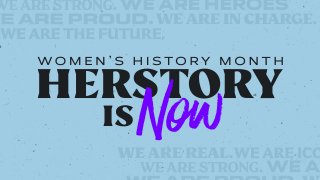
Join NBC 5 in celebrating Women’s History Month!
Women’s History Month honors and celebrates the achievements and struggles American women have endured in the United States. Throughout history, American women have faced obstacles in gaining rights not only for themselves but for a variety of other under-represented and disenfranchised groups in America.
Women’s History Month originated in 1981 after Congress passed Pub. L. 97-28. This authorized the request for the President to proclaim the week beginning March 7, 1982 to be designated as “Women’s History Week.” As requested by Congress, President Reagan issued the Presidential Proclamation 4903, which proclaimed the week beginning on March 7, 1982 as the first Women’s History Week. It focused on recognizing the vital role of women in American history.
Proclamation 4903 read, “American women of every race, creed and ethnic background helped found and build our Nation in countless recorded and unrecorded ways … As leaders in public affairs, American women not only worked to secure their own rights of suffrage and equal opportunity but also were principal advocates in the abolitionist, temperance, mental health reform, industrial labor and social reform movements, as well as the modern civil rights movement.”
Get DFW local news, weather forecasts and entertainment stories to your inbox. Sign up for NBC DFW newsletters.
Throughout the next five years, Congress continued to pass joint resolutions designating a week in March as “Women’s History Week.” After being petitioned in 1987 by the National Women’s History Project, Congress passed Pub. L. 100-9 which designated the month of March in 1987 as Women’s History Month. Between 1988 and 1994, Congress passed additional resolutions requesting and authorizing the President to proclaim March of each year as Women’s History Month.
Since 1995, Presidents issued a series of annual proclamations designating the month of March as Women’s History Month. The proclamations focus on the contributions women have made to the United States of America and recognize the specific achievements women have displayed over the course of history in an array of different fields.
For more information about Women’s History Month, visit www.womenshistorymonth.gov.
Local
The latest news from around North Texas.
LOCAL ORGANIZATIONS
Boss Women Media
CEO and founder, Marty McDonald, created Boss Women Media in 2016 as a personal need to network and connect with women who desired more from their 9-5 jobs. McDonald hosted multiple events in order to construct the organization’s blueprint, which provided the opportunity to help women cultivate the life they strived for. In 2018, McDonald left her corporate job to pursue Boss Women Media full time and transform it into a brand known worldwide.
Today, McDonald dedicates her time providing an outlet that empowers women to take action over their lives. Boss Women Media’s vision is to create a space that encourages women to be better versions of themselves.
The Fort Worth Association of Federated Women’s Club
The Fort Worth Association of Federated Women’s Clubs (FWAFWC) was organized in 1917 with Mrs. Fannie Mae Connally-Winn serving as the first president. It was the desire of Mrs. Winn that the “colored” women of Fort Worth have the opportunity to be known for their contributions and sacrificial service in the communities throughout the city.
Growth in membership prompted the association to branch into smaller groups to effectively reach the community at large. To date, there are ten local women’s clubs associated with the FWAFWC. Each club operates under its own set of officers, but all clubs are accountable to the president of the general body.
Over its storied history, the FWAFWC has produced leaders who, despite the challenges of gender and society, persevered. In the forefront of the organization’s cause has remained the commitment to ensure that women of color are aware of civic duties, social issues in the community, family health matters, cultural art awareness, and the importance, as well as responsibility of educating youth for a better future.
Hispanic100: A Network of Latina Leaders
The Hispanic 100 began as the Hispanic 50 in 1996 when local Latina leaders Delia Reyes, Bertha Outler, and Patricia Asip recognized the need for Hispanic women leaders in the Dallas area to unite and advance Latina participation in the areas of employment, procurement and social issues. The organization changed its name to the Hispanic 100 in 2003 as its membership grew.
Today, the H100 brings together a network of engaged and dedicated Hispanic women who are passionate about continuing to support each other’s success in the private and public sectors and committed to making a difference for future generations of Latinas.
Junior League
Junior League of Arlington
Junior League of Collin County
Junior League of Dallas
Junior League of Fort Worth
The Junior League was founded in 1901 by Mary Harriman, a social activism pioneer. The Junior League is one of the largest, oldest and most effective women’s volunteer organizations in the world. Since the beginning, the organization has never wavered from its mission to develop exceptionally qualified civic leaders. The civic leaders are passionate about collaborating with community partners to identify a community’s most urgent and pressing needs. Once those needs are identified, the Junior League civic leaders strive to address the issues with the most meaningful and relevant programs and initiatives that not only improve lives, but also change the way people think as well.
The Links, Incorporated
Dallas (TX) Chapter, The Links, Incorporated
Fort Worth (TX) Chapter, The Links, Incorporated
Greater Denton County (TX) Chapter, The Links, Incorporated
Plano North Metroplex (TX) Chapter, The Links, Incorporated
In 1946, Margaret Rosell Hawkins and Sarah Strickland Scott co-founded The Links, Incorporated. They invited seven of their friends to join them in organizing the new inner-city club. The organization was founded on the principles of friendship and service.
The membership of the local affiliates is primarily made up of Black professional women.
Today, the organization is comprised of 276 chapters in 41 states, the District of Columbia and the Commonwealth of the Bahamas. The not-for-profit organization is committed to serving the community.
National Cowgirl Museum and Hall of Fame
The National Cowgirl Museum and Hall of Fame began in 1975 in Hereford, Texas. The visionary group was determined to bring awareness after realizing that women of the American West had been largely overlooked for their accomplishments. The museum was first housed in the Deaf Smith County Library. After transferring to a private home in 1982, the artifacts flourished into a collection of vintage photos, rare books, saddles, costumes and more. The museum’s purpose was not just focused on preserving cowgirl history, but to also share it. In 1993, the board led by Executive Director Margaret Formby began to search for a new location for the museum that would allow the educational reach to broaden.
Today, the National Cowgirl Museum and Hall of Fame can be found at Will Roger Memorial Complex in Fort Worth’s Cultural District. The National Cowgirl Museum and Hall of Fame mission is to honor and celebrate women, past and present, whose lives exemplify the courage, resilience and independence that helped shape the West. The museum recognizes the living and the deceased honorees, who represent an array of diverse backgrounds, ethnicities and cultures.
The Texas Women’s Foundation was founded by 19 women. The founders were comprised of a deeply inclusive group that represented a broad array of diversity in ethnicity, race, culture, political affiliation and financial capacity. In 1985, the founders came together to ensure that more resources were aimed at addressing the unique issues facing women and their families. Through the founders’ efforts, the Dallas Women’s Foundation was established to unleash the power strong women have in making a better world.
In 2018, the Dallas Women’s Foundation became the Texas Women’s Foundation. Today, the Texas Women’s Foundation continues to honor and reflect their history of diversity, equity and inclusion. The organization is a leading driver in advocating for and advancing social and economic change for women and girls in Texas.
A. (2009). AJLI. Retrieved February 22, 2021, from https://www.ajli.org/
About the Museum. (2017). Retrieved February 22, 2021, from http://www.cowgirl.net/museum/about-the-museum/
About Us. (2020, December 11). Retrieved February 22, 2021, from https://bosswomen.org/
Fort Worth Association of Federated Women’s Club. (2021). Retrieved February 22,2021, from www.federatedwomenfw.org
Hispanic100 A Network of Latina Leader. (2020). Retrieved February 22, 2021, from https://www.dfwhispanic100.org
The Links, Incorporated. (2021, January 11). Retrieved February 22, 2021, from https://linksinc.org/
Texas Women’s Foundation. (2020). Retrieved February 22, 2021, from https://www.txwf.org/about-us/
Women’s History Month. (2021). Retrieved February 22, 2021, from https://womenshistorymonth.gov/



